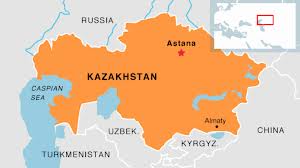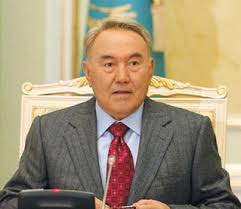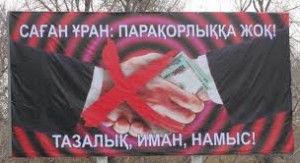Kazakhstan: Corruption and Stability?
 Kazakhstan is the most economically prosperous of the former Soviet Republics. Along with economic growth, however, has come significant corruption.
Kazakhstan is the most economically prosperous of the former Soviet Republics. Along with economic growth, however, has come significant corruption.
Much of Kazakhstan’s growth has been due to its vast supply of natural resources, especially oil. The Kazakhstan government has kept tight control of the oil supply and government officials have benefited from its enormous oil wealth. Kazakhstan is ranked the same as Russia — 133 out of 185 for 2012 CPI ratings.
While the government wants to institute a number of important economic reforms, corruption has been a major obstacle to implementing these reforms. Businesses entering Kazakhstan are frequently faced with serious corruption risks, especially in the oil sector. Several prominent oil companies have settled FCPA charges for bribing Kazakh officials to obtain oil and gas contracts. In addition, the government bureaucracy is frustrating to deal with because of long delays, frequent business inspections and corrupt government officials. Government workers treat business services as vehicles for personal gain.
Some senior officials even take ownership interest in oil industry private ventures Their ownership interests are masked through elaborate schemes of corporate ownership using multi-layers of corporate interests and nominees who are figureheads of businesses.
In addition, the country suffers from corrupt mid-level and lower-level government workers responsible for customs enforcement and regulation for exports and imports. The judiciary, police, land registration and construction projects are all rife with corrupt officials.
Despite these major difficulties, Kazakhstan’s economy continues to grow and foreign investment flows into the country. Kazakhstan’s anti-corruption agency, the Financial Police, has adopted a four-year plan to reduce corruption in the government.
The government has taken steps to reduce corruption by training government employees on anti-corruption policies and practices, and by raising the level of pay for government workers. In addition, the government has tried to elevate the education and performance of government workers.
President Nursultan Nazarbayev, the popular President of Kazakhstan, has taken a strong-anti-corruption stance. Unfortunately, his words have not been translated into any meaningful actions. President Nazarbayev has been in power since the inception of Kazakhstan’s government since 1989, and has provided political stability and prosperity based on the country’s oil wealth. The most famous corruption case involving President Nazarbaev settled in 2010. According to the DOJ indictment, James Giffen and a New York-based merchant bank paid more than $80 million in bribes to President Nazarbaev.
President Nazarbaev continues to enjoy unlimited power but the country’s stability was recently threatened as a result of the government’s shooting and killing of striking oil workers in the Mangistau region. The public recoiled at the incident and activists have been energized to challenge the regime.
 Corruption continues to eat away at the legitimacy of the government. The legal system adheres to principles of justice and impartiality but in practice protects the ruling elite from individual citizens, journalist, and other organizations challenging the President’s rule. Corruption investigations are handled by a presidentially-appointed prosecutor general and the financial police, who work with the Ministries of Justice and Internal Affairs and National Security Committee, and who are both beholden to the President.
Corruption continues to eat away at the legitimacy of the government. The legal system adheres to principles of justice and impartiality but in practice protects the ruling elite from individual citizens, journalist, and other organizations challenging the President’s rule. Corruption investigations are handled by a presidentially-appointed prosecutor general and the financial police, who work with the Ministries of Justice and Internal Affairs and National Security Committee, and who are both beholden to the President.
Under current leadership, there is little chance of real reform and reduction in corruption. As the middle class grows from economic prosperity, they may demand more significant changes and reform. The social stability, which has long been trumpeted in Kazakhstan, may start to deteriorate as middle class workers demand reforms.
















Excellent article. I have spent many years in Almaty working on a rail project for a U.S. investor/developer and experienced all of the challenges outlined in your article.